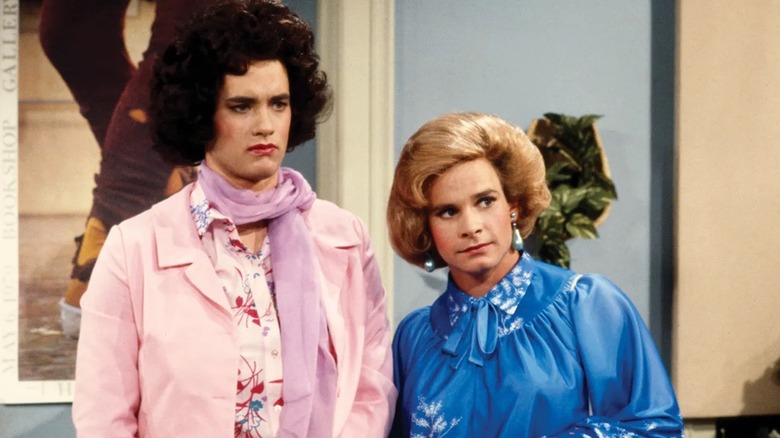The ’80s Sitcom That Launched Tom Hanks’ Career

For much of the 20th century, if an up-and-coming actor was eying a movie career, taking a prominent role in a television series could be perilous. While it may be hard to believe now, there was a time when film was considered a far more prestigious line of work than getting beamed into the living rooms of viewers all over the world. Obviously, breaking through in television wasn’t an automatic death knell (just look at Clint Eastwood, who, in the 1960s, went from “Rawhide” to overtaking John Wayne as the most popular Western movie star on the planet), but familiarity could breed a fixed set of expectations. Ted Danson could’ve been a huge movie star, but after a few seasons of brilliant work in “Cheers” all people could see was Sam Malone. Tom Selleck, the man who almost was Indiana Jones, faced similar struggles as he tried to break free of his “Magnum P.I.” persona.
So, when Tom Hanks, after making his bones as a performer in the Great Lakes Theater Festival in Cleveland, Ohio, moved to New York City to pursue a professional acting career, it’s possible he was mindful that a successful television acting job could limit his options in the film industry. Being that he was in his early 20s at the time, it’s more likely he believed, as most young adults do, that the rules did not apply to someone as unique and brilliantly talented as himself. Furthermore, after booking a single movie role over four years, all while getting cast in numerous television shows, he almost certainly realized that if he was serious about earning a living as an actor, he needed to go where the work was.
And to be completely honest, when Hanks appeared on shows like “Taxi” or “Happy Days,” he looked like he belonged on television. He was a silly, loose-limbed dude who got big laughs out of exasperated outbursts. He seemed like a natural for broad sitcom comedy, and he might’ve gotten stuck in that realm for a long time had “Bosom Buddies,” which aired between 1980 and 1982, lasted longer than two seasons.
Tom Hanks’ television stardom was short-lived
Created by Chris Thompson, Thomas L. Miller and Robert L. Boyett, “Bosom Buddies” revolves around the zany antics of Kip Wilson (Hanks) and Henry Desmond (Peter Scolari), two low-level ad agency employees who, after their apartment building is demolished, pose as women in order to rent a room in a cheap, all-female apartment building. This was an initially amusing premise in 1980 (it’s safe to say “Bosom Buddies” would never be made today), but it hamstrung the writers, who had to keep up the suspense of Kip and Henry’s ruse in every episode. It got exhausting fairly quickly, which was a shame because Hanks and Scolari had a terrific rapport and generated big laughs out of occasionally improvising their dialogue.
The show wasn’t a critical favorite nor did it ever catch on with viewers. A big reason for the latter failure was its timeslot, which changed multiple times over its first season on ABC. This kept the show from finding a loyal audience, leading to a low-rated second season during which, ironically, the quality of the series improved due to the writers backing away from the cross-dressing element. Hanks and Scolari shined, which might’ve been enough to get the show another season had the ratings even slightly improved.
While he was undeniably funny on “Bosom Buddies,” Hanks’ work on the show didn’t exactly make him look like a future movie star. So, it was something of a shock to see him dial down his cartoonish energy down a skosh and capably play a comedic leading man in Ron Howard’s “Splash.” Hanks then reverted to his old shtick in the wildly problematic 1984 hit “Bachelor Party” and wouldn’t demonstrate much in the way of range prior to playing the son of an obstreperous Jackie Gleason in Garry Marshall’s ho-hum “Nothing in Common.” It wasn’t until Hanks starred in Penny (sister of Garry) Marshall’s 1988 smash “Big” that it became overwhelmingly obvious that he was going to be a great big movie star. And this was only possible because ABC badly fumbled the two-season run of “Bosom Buddies.”
Source link







